Lucian Bute: The Return
Lucian Bute is far more comfortable communicating in his native Romanian, or in French, the official language of his adopted home city of Montreal, but during his talk with this anglophone writer at the Grant Brothers Boxing gym a few days ago, no language barrier could hide his enthusiasm and desire to finally return to the ring. Indeed, at times certain English words were uttered with great conviction and perfect pronunciation.
In the time since his shocking defeat to Carl Froch back in May of 2012, did he ever consider retirement? “Never!” Does he believe he can reverse his 2014 loss to Jean Pascal? “Of course!” Does he regard his new managerial and training team as the best he’s ever had? “Absolutely!”
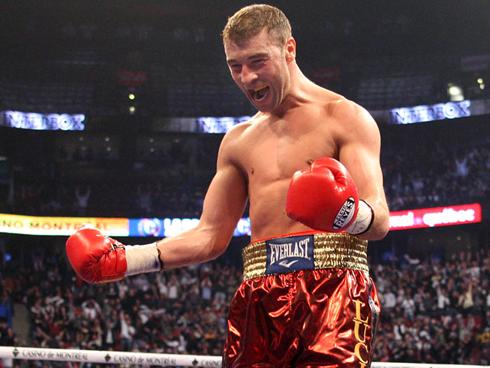
These remarks and others revealed a Lucian Bute who is, perhaps for the first time in years, brimming with confidence and eager to fight. But the former super-middleweight champion was equally candid about the fact it has not been an easy journey over the last few years, with some harsh lessons and difficult decisions along the way.
One of those decisions was to break ties with his long-time trainer Stéphan Larouche, the man who helped guide Bute to the IBF super-middleweight championship and who was in his corner for wins over the likes of Sakio Bika, Alejandro Berrio, Librado Andrade and Glen Johnson.
One senses that severing ties with Larouche would not be painless for someone as agreeable and easy going as Lucian Bute. The man some called “Mister KO” is no scowling, surly, ill-tempered alpha-male, but instead one of the nicest guys you could ever hope to meet in a boxing gym. Always smiling for the cameras, the newly-minted Canadian citizen and happily married young man exhibits nothing but class both in and out of the ring and is highly popular in his adopted home.
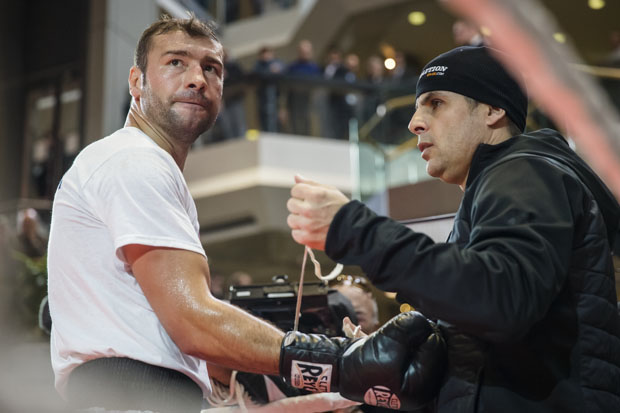
But while the move to part ways with Larouche may not have been an easy one, in some respects, it may have been overdue. The Canadian trainer was criticized following the Froch fight, both for his decision to send Bute back out for more punishment after the Romanian-Canadian had endured a thrashing and it was clear he could not win, and for his subsequent public comments which put the blame for the loss squarely on Bute’s shoulders.
But Lucian showed his loyalty by sticking with Larouche for his next two outings, a less-than-scintillating 12 round win over Denis Grachev and then a one-sided loss to Pascal. Naturally, one wonders if Bute is now in a position to put all the setbacks behind him as he declares his intention to resume his career on the same day that, ironically, Carl Froch has announced his retirement. But for Bute, there is a great reluctance to look backwards at all.
“Now, I feel good,” he says, steering the conversation back to the present. “My mind is clear and I feel positive and motivated. I like what I do; I like my team. It’s a fresh start.”
The fact Bute has surrounded himself with new people and a new team appears to be key. For Bute, boxing is not just about the lone fighter answering the bell; it’s as much about the supporting cast, a fact borne out when he is asked if he felt disappointed with Larouche following the Froch bout.
“No,” he answers with a shake of his head. “Because it’s a team effort. Yes, it’s just me in the ring, but when I win everyone gets some credit. And when I lose, we all lose.”
Refreshingly, Bute blames no one else, repeating the phrase “No excuses, no excuses …” as he struggles to satisfy the writer’s curiosity. But when pressed, Bute was willing to shed some light on a match which still mystifies longtime observers of “Le Tombeur.” Why the failure to use his speed and boxing skills against Froch? Why the apparent eagerness to trade punches with “The Cobra” in the opening round? Was the plan to ambush Froch and try for an early knockout?
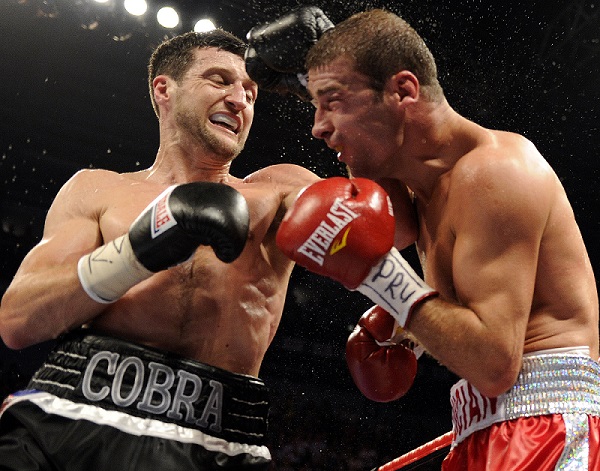
“No, that was not the plan,” states Bute flatly. “It’s easy to make excuses. No excuses. I lost. But the fact is three weeks before the fight I had to deal with injuries. This is maybe the first time I have talked about it. But I had an infection, my toe, it was all swollen and I had to take antibiotics for ten days. Then my left hand was injured, a contusion. We did an MRI, took anti-inflammatories, used double wraps on the hand. But my left hand, my power hand, was not strong.”
The success of any professional athlete is built upon the foundation of confidence and the willingness to compete, and Bute is certainly not the first boxer to enter the ring with an injury or after a bad training camp. But the legitimate question remains: should someone have intervened and pushed for a change of plans when Bute was clearly not at his best?
“I am disappointed with Stephan Larouche for this one thing,” admits Bute. “Why didn’t he put off the fight? Of course I will say, ‘Yes, even with these problems, I can beat him.’ But sometimes a fighter needs to be protected.” Still, Bute emphasizes: “No excuses. I lost.”
But clearly a lesson was learned, one which eventually led him away from Larouche and towards new trainer Howard Grant.
As for his second career defeat, a 12 round decision loss to Jean Pascal in January of 2014, Bute again avoids making any excuses. Was competing for the first time in the light-heavyweight division against a clearly bigger man part of the reason for that setback?
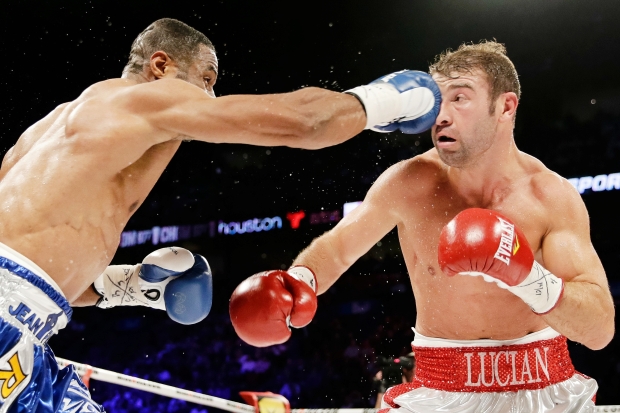
Bute is unequivocal: “No, the weight was not a problem. I was just not recovered, not focused mentally after the Froch fight. It wasn’t Pascal; it was me. I know if I’m at my best, I can perform better, much better. I’m sure of it. If I’m at my peak, I can defeat Pascal.”
Larouche was in Bute’s corner for that match as well, but it will be the final time. And if Bute does not hold Larouche responsible for the biggest setbacks of his career, he also recognizes there was a need for change. “After eleven years, doing the same thing day after day, I just decided it was time to change something. Larouche helped make me a world champion and I have great respect for him, but I just needed something different.”
The search for something different led Bute to working with Freddie Roach for a number of weeks as he set himself for a comeback match this past December. A back injury resulted in Bute withdrawing from the bout — he had learned his lesson about competing when not 100% — but at the same time he realized having Roach as a trainer meant getting in line and working around someone else’s busy schedule.
After taking some time off to let his back heal and visit with his family in Romania, Bute signed with Al Haymon. He then started training on his own before deciding to pay Otis and Howard Grant a visit. And the focus on a team approach, on having people available and close at hand to help, was a clear priority. Since May he has been working diligently at the Grant Brothers Gym in Dorval, a suburb of Montreal, and it appears the new team is now in place.
“I like it here very much,” says Bute with a smile. “It’s a great group of people, everyone friendly, like a family. And now it’s a pleasure to train. I enjoy it. I get up and every morning I look forward to going to the gym again.”
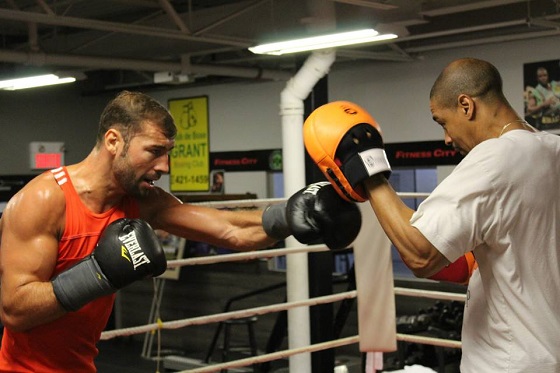
It’s also worth noting that in the past the tasks of negotiating contracts and managing the details of Bute’s career fell to him. “I was self-managed,” he says. Not anymore. With Howard Grant heading up the training work, and Chris Ganescu, Otis Grant and Al Haymon overseeing pretty much everything else, Bute is now free to focus solely on the tasks of conditioning and preparation.
“My job is just to be healthy, in shape, focused, and ready to perform.”
And judging from what one sees when an obviously relaxed and comfortable Lucian Bute works at the Grant Brothers Gym, he appears to be holding up his end of the deal quite admirably, putting in the rounds six days a week and sparring regularly with hungry, young fighters such as Erik Bazinyan and Francis Lafreniere.
So, just as Carl Froch decides to pack it in, Lucian Bute is starting over. Today his opponent for the August 15 event will be announced and he’ll answer questions from the press in French and Romanian, as well as English. A new team, a new gym, a fresh attitude, and a shiny, new five year contract with the most powerful man in boxing. Not bad for a 35-year-old boxer with two losses in his last three fights. It will be fascinating to see how this next chapter in Bute’s career unfolds. And you’ll forgive this otherwise objective reporter if he hopes it has more highs than lows for one of the nicest guys in boxing. — Michael Carbert



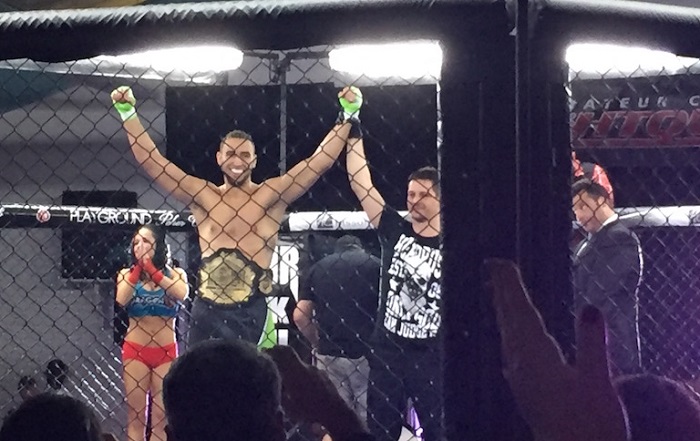
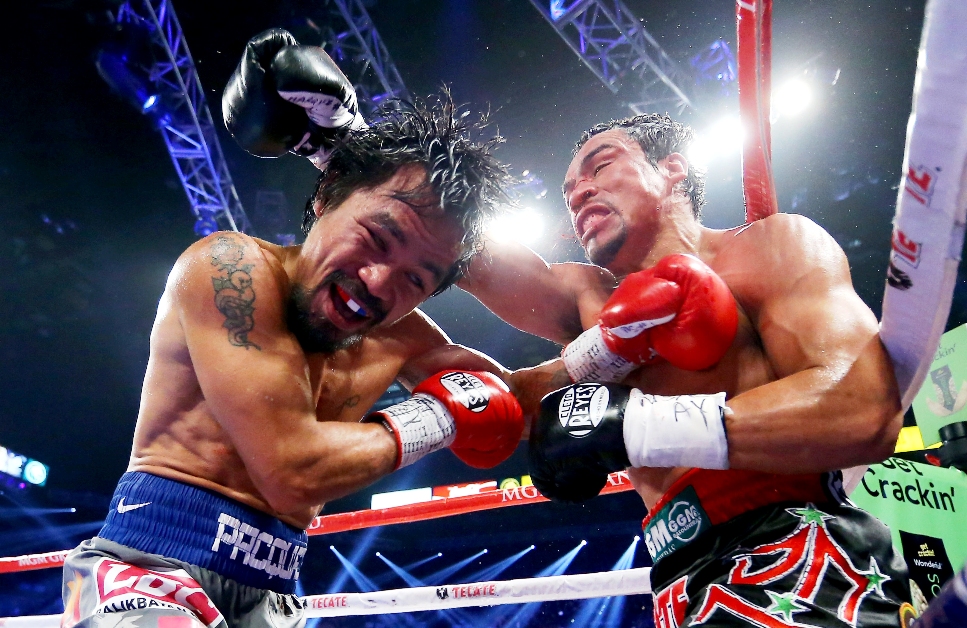
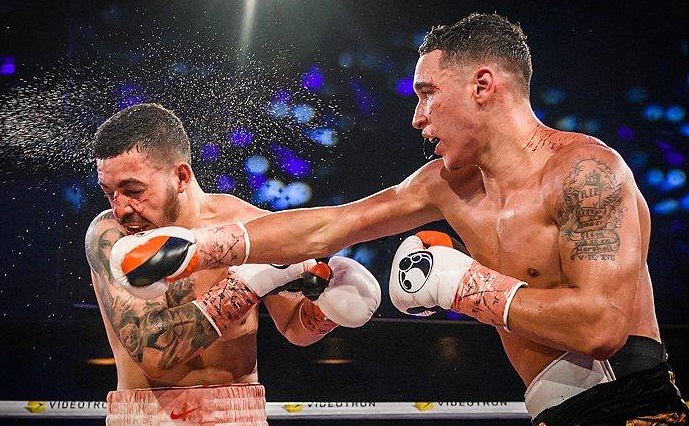
Bute is a talented fighter and he took care of business with Di Luisa in August. It was a tougher challenge for him to face James DeGale in November and while he put up a great fight, DeGale had the edge. In Badou Jack I think he will have an equally tough opponent. Good luck to Bute!